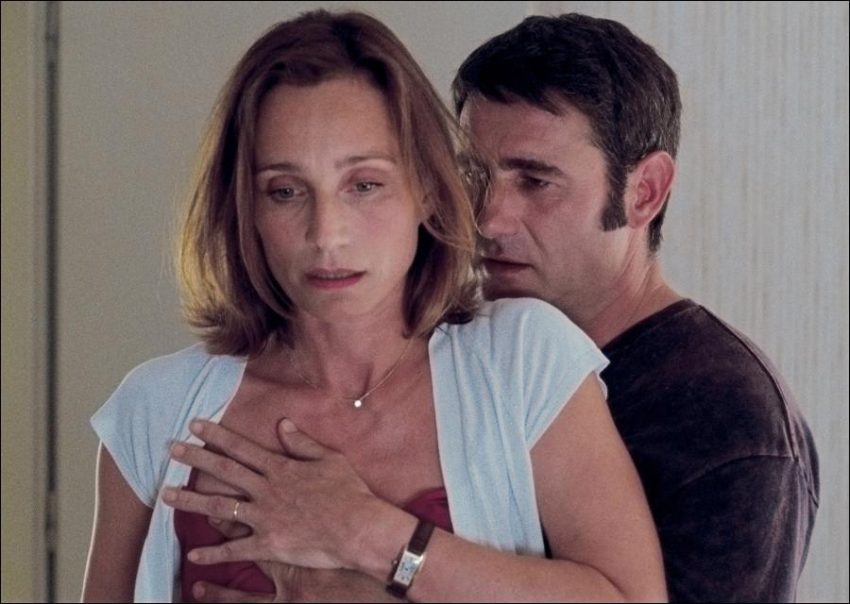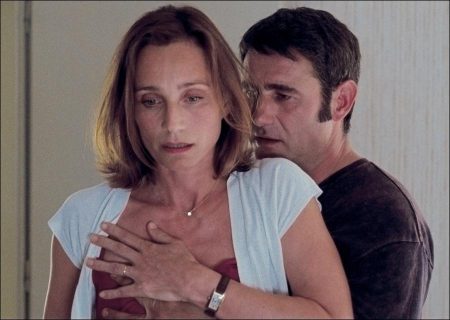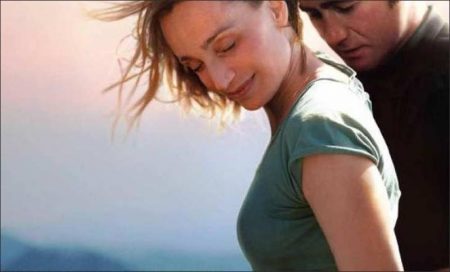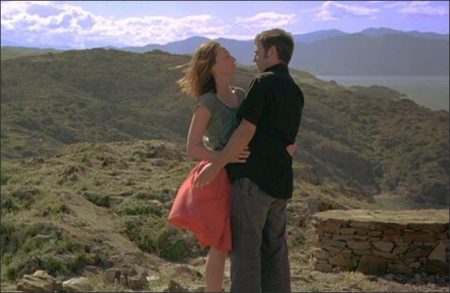Suzanne (Kristin Scott Thomas) is a devoted doctor’s wife and mother of two teenagers living in the South of France. Although she seems to have it all, a beautiful home, all of the material possessions a woman could want and a loving family, she has put her own life on hold for fifteen years and in doing so has unknowingly lost herself. With the children almost grown, she feels it is time to return to work as a physiotherapist.
When her husband hires a contractor to fix up an office for her, Suzanne meets Ivan, a handsome Spanish builder, recently released from prison for a petty crime. Although Suzanne and Ivan are from completely different worlds, or perhaps because of this, the mutual attraction is sudden and intense. Overwhelmed with a passion she has never felt before, Suzanne must decide if following her desires is worth losing everything.
Leaving (French: Partir) is a French film directed by Catherine Corsini, written by Corsini and Gaeelle Mace, and starring Kristin Scott Thomas, Sergi López, Yvan Attal, Bernard Blancan, Aladin Reibel, Alexandre Vidal, Daisy Broom, Geneviève Casile, Berta Esquirol, Gérard Lartigau and Hélène Babu.
About the Story
There have been so many variations on D.H. Lawrences Lady Chatterley’s Lover over the past eighty years that it has become almost a genre of its own. Few, however, have been as successful in elucidating Lawrence’s theme of the psychic need to integrate mind and body into a single life force as Catherine Corsini’s Leaving.
Suzanne (Kristin Scott-Thomas) is an English woman who tries to leave her French husband Samuel (Yvan Attal) after becoming sexually involved with Spaniard Ivan (Sergi Lopez) an ex-convict who has been hired to build an office for her physiotherapy business in the back yard of their bourgeois estate. Samuel uses every means at his disposal , from cutting off her finances to threatening prison for her lover, to keep her in the house, until she finds but one means of exit.
It is to both Corsini and Scott-Thomas’s credit that such a stale premise has resulted in a movie that succeeds so well as both a celebration of erotic self-discovery and denunciation of patriarchal power structures. Corsini is lean and precise in both her script and direction. The first kiss between the lovers is seen in long shot from an obscure angle that makes the viewer question if anything really happened. Then Corsini cuts to a shot of them in a car, and we expect but do not receive a dialogue concerning the kiss, after which Suzanne is shown in bed with her husband, reading because of an apparent inability to sleep.
Scott-Thomas gives a performance of exacting physicality. In the beginning, she is all limbs and no center, observing her own body with curious amusement. Her first tryst with Ivan is accomplished through an almost paralytic clinging, as if she is a dead battery charging itself. Before attaining the perfect harmony of body and mind, there is an interim transformation during which her husband accurately if disparagingly describes her as a bitch in heat.
Samuel’s fury at his wife’s defection explodes with the incredulous rage of a factory owner whose workers have gone on strike. “You are my wife!” he insists, reducing her to a possession without a personal identity. All the rules of civility between human beings are forgotten in the ensuing battle between the former partners in a now ruptured marriage.
In transgressing the boundaries of class as well as the limits of sexual fidelity, Suzanne loses her bourgeois privileges and becomes subject to the economic harassment of the those controlling the chains of finance, from the banks to the justice system. In the end, the lovers are outlaws, frolicking in the lusciousness of the natural world, while the distant sound of police sirens echo Raymond Chandler’s aphorism that you can say goodbye to just about anything except the cops
Leaving – Partir (2010)
Directed by: Catherine Corsini
Starring: Kristin Scott Thomas, Sergi López, Yvan Attal, Bernard Blancan, Aladin Reibel, Alexandre Vidal, Daisy Broom, Geneviève Casile, Berta Esquirol, Gérard Lartigau, Hélène Babu
Screenplay by: Catherine Corsini
Production Design by: Laurent Ott
Cinematography by: Agnès Godard
Film Editing by: Simon Jacquet
Costume Design by: Anne Schotte
Distributed by: IFC Films
Release Date: October 8, 2010




